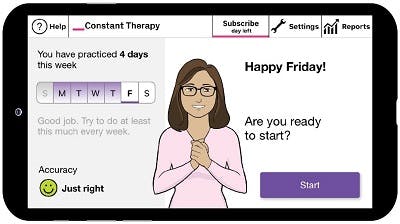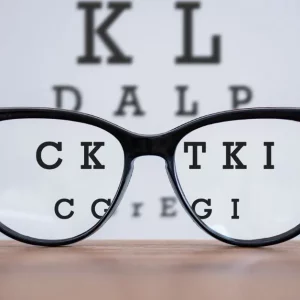Slurred speech is a common effect of head injury. Fortunately, by working with a speech therapist, individuals can learn effective ways to become a better communicator or overcome slurring altogether.
To help you understand slurred speech after a head injury, this article will discuss:
- What causes slurred speech after head injury
- Symptoms that can occur alongside slurred speech
- Treatment for slurred speech
- Tips for improving communication
- Tips for the listener
What Causes Slurred Speech After Head Injury?
Slurred speech after a head injury is called dysarthria. It occurs when the areas of the brain that control the muscles used for speech are damaged, leaving the muscles for speech weak or paralyzed.
As a result, individuals may know exactly what they want to say, but struggle to say the words clearly.
Damage to various areas of the brain can cause slurred speech, including:
- Motor cortex: affects voluntary muscle movement
- Cerebellum: affects coordination
- Basal ganglia: affects involuntary movements
- Brain stem: affects muscles used in breathing and those used to help make sounds
The severity of slurred speech primarily depends on the severity of the brain injury. Some individuals may be extremely difficult to understand, while others may only slur certain words.
Dysarthria is a separate condition from aphasia, which is a language disorder that involves difficulty understanding and/or expressing language, and may also affect reading and/or writing. While dysarthria and aphasia are both communication disorders, dysarthria is a speech impairment, while aphasia is a language impairment.
In the following section, we’ll discuss other speech problems that individuals with slurred speech may experience after head injury.
Other Symptoms of Dysarthria

It’s suggested that anywhere between 10-60% of traumatic brain injury survivors experience dysarthria.
Depending on the location and severity of their head injury, individuals may experience additional symptoms alongside slurred speech.
Other common symptoms of dysarthria include:
- Slow speech
- Quiet volume
- Mumbling
- Breathiness
- Lack of expressiveness/ Monotoned speech
Due to poor control over the muscles used to speak, individuals may also struggle with chewing and swallowing.
Up next, we’ll discuss how to treat slurred speech after a head injury.
Treatment for Slurred Speech After Head Injury

Depending on the severity of the head injury and consequent dysarthria, prognosis will vary. Fortunately, dysarthria caused by a traumatic brain injury is non-progressive, meaning that it will not get worse. With the right support and treatment, individuals may be able to improve their slurred speech.
Treatment of dysarthria must be personalized to address each individual’s specific needs; therefore, working with a speech-language pathologist (SLP) is ideal.
One of the main goals of speech therapy is to maximize the patient’s ability to communicate with others. They will assess your unique speech problems and create a personalized rehabilitation plan using a combination of restorative and compensatory methods.
Restorative methods focus on improving slurred speech by using speech therapy exercises to strengthen control of the mouth and tongue. Ultimately, restorative methods focus on promoting neuroplasticity (the brain’s ability to reorganize itself) through highly repetitive, task-specific activities and exercises.
In contrast, compensatory methods involve using alternative strategies to promote better communication with others. This can involve adjusting your posture, avoiding difficult words, gesturing or using images, and using shorter sentences.
Up next, we’ll discuss some tips for improving your communication skills.
Tips for Communicating with Slurred Speech After Head Injury

Becoming a more effective communicator allows you to be more independent, confident, and improves your quality of life.
The following are four helpful tactics speech therapists may give their patients to help cope with slurred speech issues in day-to-day activities.
These techniques should help you convey yourself easier to others.
1. Speak Slowly
It may be frustrating at first, but consciously speaking slower will make articulating your words a little easier and also give your listener time to comprehend you better.
2. Use Short Words and Phrases
Start with smaller words and sentences so that your conversation partner will be able to easily follow. This also reduces the chances of you tiring out before finishing what you want to say.
A great method you can try using is to say one word or phrase that signals what the topic is going to be before moving on to full sentences. For example, you could say “food” before talking about what you want to eat for lunch.
3. Pause Often
It’s helpful to periodically pause and check to make sure your listener is understanding you well. It also gives your facial muscles a little break, which will help you to speak for longer.
4. Use Gestures
Never underestimate the power of hand gestures! They are often very effective and most people use them already.
If all else fails, you can always get creative with a drawing or written message.
Tips for Family and Friends
Communication is a two-way street. You don’t need to do all the work on your own to make yourself understood. There are techniques your listener can also use to make conversation easier.
Here are some more tips you can share with your family and friends so they will be able to communicate with you better.
5. Read My Lips
Encourage your listener to pay close attention to you as you speak. This will help them understand what you are saying.
6. Don’t Be Afraid to Ask Questions
Your listener shouldn’t try to pretend they can understand you when they actually cannot. This is not helpful to either of you. Encourage them to be honest and ask questions!
It might even be helpful for them to repeat back what they think you said and what they are not sure of, so you don’t have to start all over from the beginning.
7. Ask Yes or No Questions
With that said, your conversation partner should try to use yes or no questions as often as possible. This puts less strain on you and will make communication flow smoother between you.
Speech Therapy Apps for Slurred Speech After Head Injury

Improving slurred speech after a head injury is all about stimulating the brain through consistent practice.
Downloading a speech therapy app (like the CT Speech and Cognitive Therapy App) on your phone or tablet can give you access to many helpful exercises that you can practice whenever you want.
The CT app was created by a team of neuroscientists and SLPs to help people with neurological injuries like traumatic brain injury improve their speech and language skills. It includes a library of over 100,000 clinically-effective speech therapy exercises and an algorithm that adapts to your skill level.
Your SLP can also assign exercises to practice on the CT app in-between sessions and monitor your progress over time.
Coping with Slurred Speech After Head Injury
Slurred speech after a head injury can be frustrating. You may feel as though you’ll never be understood again, but as this article has hopefully shown, that is not the case!
There are many different treatments available to help you manage your slurred speech. By utilizing the techniques listed above, and sharing them with your family and friends, you can make meaningful improvements and start to communicate effectively with others once again.










